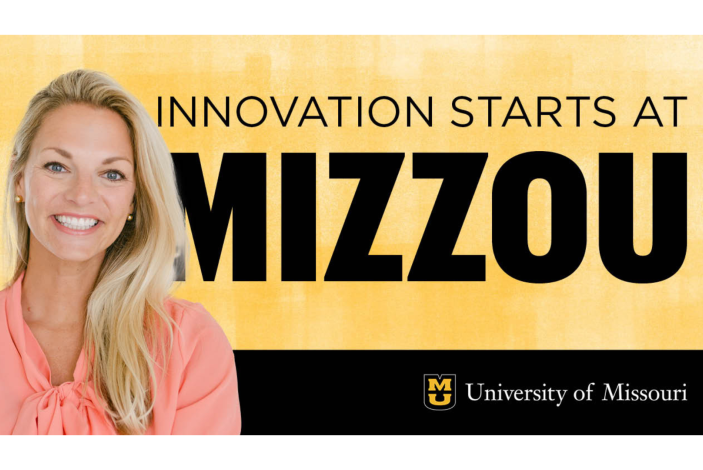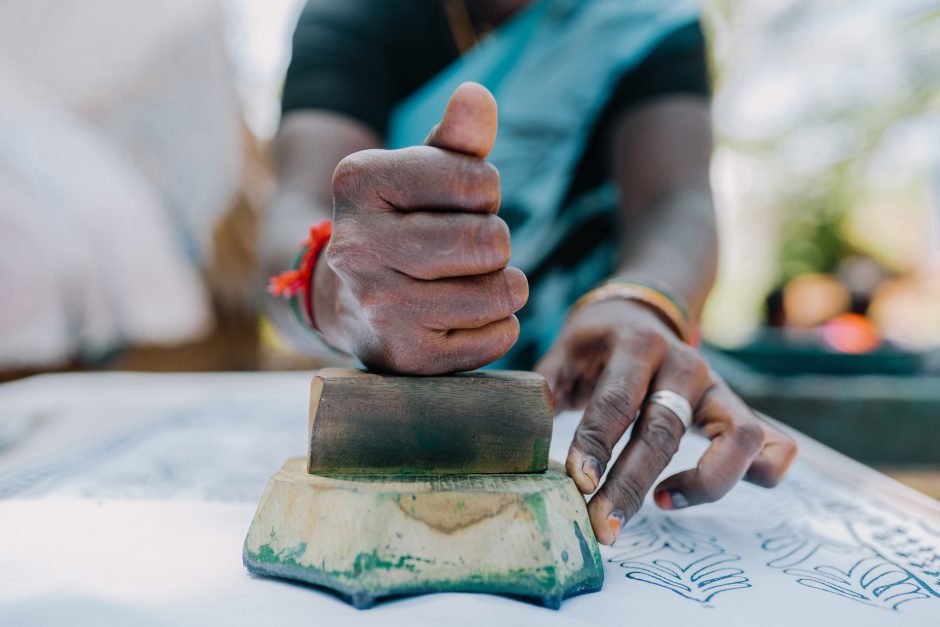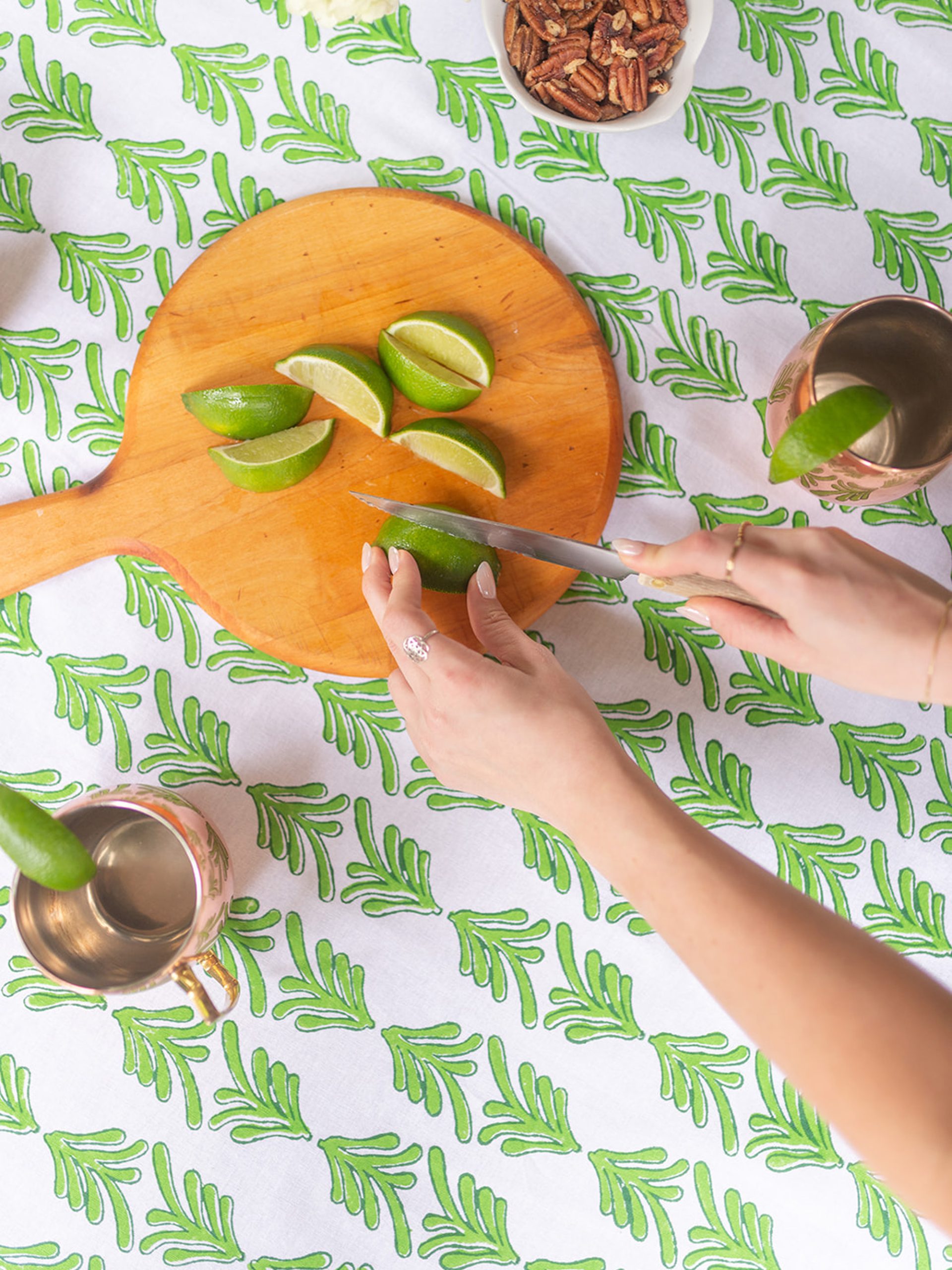
Printing linens, providing hope

Mizzou alumna Mallory Martin’s company economically empowers survivors of modern-day slavery through the ancient craft of block printing.
Article courtesy of Show Me Mizzou.
Mallory Martin, B.S.B.A. ’06, M.B.A. ’08, is combating modern-day slavery one tea towel at a time.
Martin is founder and CEO of Mended, a socially conscious company that economically empowers those who have escaped indentured servitude in South Asia. She works with artisan survivors to create hand-crafted linens, providing them with above-market wages as they transition to a life of freedom.
“To me, innovation is about being curious,” Martin said. “It’s learning about others so I can understand what might help them. It’s less about what’s being created and more about who needs it and why.”
A heart for service, a head for business
Martin comes from a family of Tigers. She said when it was time to choose a university, Mizzou wasn’t just the obvious choice: It was the right one.
“I loved my time at Mizzou,” she said. “When I arrived in 2002, I knew nothing about what I wanted to do or what I was good at. I discovered those things at Mizzou. I really loved the business world because of the business school. I’m eternally grateful for those years.”
In the Robert J. Trulaske, Sr. College of Business, Martin studied various business practices, learning to discern characteristics of successful for-profit and non-profit models. Outside of class, she explored service through Young Life, a faith-based organization, and philanthropy through her sorority, Kappa Alpha Theta.
“I discovered that I really cared about helping people, but I was figuring out what that looked like in the real world and from a business standpoint,” she said. “All of that came to a head at Mizzou.”

A fateful journey
In 2019, Martin was working for International Justice Mission, a global organization that protects people in poverty from violence. That year, she took a group of donors to South Asia to meet with people whom the organization had helped out of bonded slavery.
The survivors shared similar stories of how they or family members had borrowed money in exchange for labor. Because of exorbitant and illegal interest rates, they found themselves unable to repay the debt, which forced them to remain in inhumane, often violent, working environments.
“I was able to talk to these incredible people who had endured so much, and they were so joyful and courageous,” Martin said. “I remember thinking I wanted to be part of that group and that story.”
Her opportunity would come as the COVID-19 pandemic began to envelop the globe. In March 2020, Martin learned that the matriarch of the community she’d met had begun sewing masks.
“My husband and I decided to purchase 1,000 masks to give to friends and family and to also give her some work,” Martin said. “It was a life-giving project and brought us a little bit of joy in the midst of such a dark season for everyone.”
Over the next couple of months, Martin brainstormed ways to continue to collaborate with the survivors. That fall, she learned about the resurging popularity of block printing, an ancient technique in which artisans use carved wooden blocks to imprint dyed designs onto fabric.
“I knew in my gut this could be a product that people in the States would want — and it could provide sustainable wages to artisan survivors,” she said.
Martin made some calls within her organization and discovered that some survivors were already being trained in block printing. She hired a graphic designer, sent a pattern and materials to South Asia — and Mended was born.

Preparing for growth
Today, 23 artisans are fully trained to help block print linens and fill orders for Mended-designed tablecloths, dinner napkins, apparel and more. Martin has two employees in Dallas, where she has a showroom, and works with a business partner in South Asia to source raw materials and place orders. Her goal is to grow to include a survivor-led operation overseas economically empowering 1,000 artisan survivors.
Martin knows that collaboration will be key to success. In addition to partnering with artisans, she also works with other businesses and groups. Mended products can be found in more than 50 shops and markets across the U.S., as well as online. In 2022, Martin worked with the pop rock band OneRepublic to order custom block-printed T-shirts. She even collaborates with Demi Leigh Tebow, the former Miss Universe who advocates for brands that impact the world.
And Martin continues to leverage her Mizzou connections — namely former executives at Learfield Sports, where she first worked as an intern and later as a director in the Dallas office. Former Learfield leaders Roger Gardener, B.S. ’83, and Andy Rawlings, B.S. ’92, currently serve on the Mended advisory board.
“Without those connections, I wouldn’t be where I am,” Martin said. “And without Mizzou, none of this would have been possible.”
Editor’s Note: We all have ideas. At Mizzou, students learn to turn them into something real. Innovation Starts at Mizzou is a series that highlights Mizzou Made changemakers who are impacting the world. Innovation. It’s in our DNA.